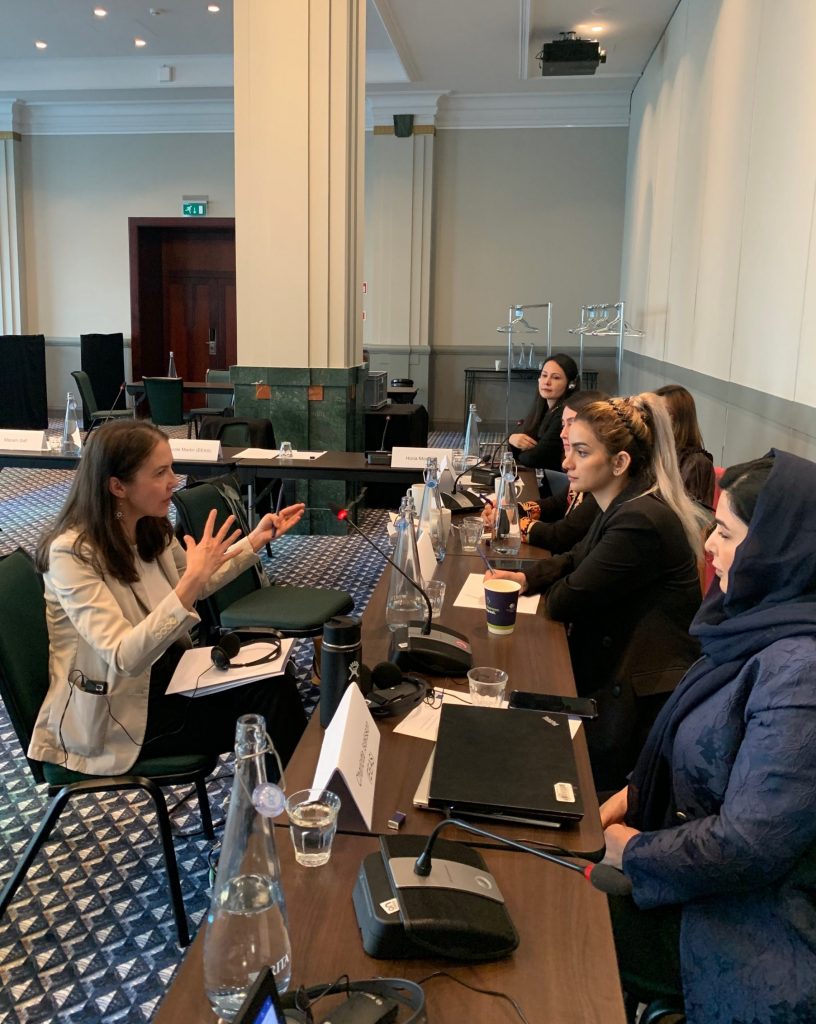Afghan Women Leaders’ Forum calls for inclusivity and international cooperation

Afghan Women Leaders’ Forum took place in Brussels in a hybrid format on 19-20 May.
The Afghan Women Leaders’ Forum aims to ensure the inclusion of Afghan women in the political dialogue about the future of Afghanistan. The initiative is implemented with the support of the EU in partnership with the Folke Bernadotte Academy and CMI. Read below the press statement from the members of the Forum.
Almost 60 Afghan women leaders reconvened on 19-20 May in Brussels for a second meeting of the Afghan Women Leaders’ Forum (AWLF). The Forum included a wide variety of Afghan women; civil society and political leaders and activists, business women, lawyers, journalists and representatives from the women’s movement, both from within and outside of Afghanistan.
The Forum members agreed on establishing three thematic working groups:
1. Political participation
2. Education, employment and private sector and
3. Human rights and women’s rights, each group having a coordination committee to support the group with execution of priority interventions.
The establishment of a common objective, strategy, terms of reference and an action plan are the immediate priorities of the Forum members to ensure structural and effective operationalization of the Forum as a bottom-up movement for change. This will enable the Forum to contribute to shaping the future of Afghanistan.

CMI’s Interim Head of Women in Peacemaking team Elisa Tarnaala and participants of AWLF.
In the forum, the participants raised serious concerns about the situation in Afghanistan in particular with regards to various issues regarding governance, human rights and women’s rights.
Main concerns of the members of the forum included lack of inclusivity in the governance and political processes, assassinations of previous government officials specially members of ANDSF, ethnic minority genocide and violation of internationally accepted benchmarks including the UN Security Council Resolution 1325 and Security Council Resolution 2513.
The participants raised concern on systemic annihilation of women and girls as active members of the society and systematically depriving their human rights across the country. All in all, increased number of Afghans are affected by malnutrition, poverty, deteriorating banking situation, decrease in trade, and high unemployment rate in the country.
The forum recommends the following:
- Taliban should revoke or withdraw 24 decrees that violate human rights, freedom of media and specially women’s rights such as education, employment of women and their decision making role in the political and development spheres.
- The women agreed on the importance of dialogue and engagement of all Afghan people living in Afghanistan and outside Afghanistan through various platforms about all political and development processes in Afghanistan conditional to Taliban’s conduct, with all relevant local, regional and international actors, exploring different models for dialogue that will allow Afghan women to influence and play a meaningful role in the future of the country.
- Taliban’s international trips should be banned by the international community as the Taliban have not fulfilled conditions of their previous agreements, while they have violated human rights, in particular women’s rights and freedom of media.
- According to UN Security Council Resolution 2513, the Taliban is not a legitimate authority; there should be a legitimate government elected by the people of Afghanistan based on justice and a genuine, internationally accepted political process.
The Forum met in a hybrid format as a continuation of the structured dialogue that was launched at the first AWLF on 10 March to ensure women participate in the dialogue about the future of Afghanistan and the role of women in the country. The Forum was chaired by Stella Ronner-Grubacic, EU Ambassador for Gender and Diversity, and Tomas Niklasson, the EU Special Envoy for Afghanistan.
The forum also engaged in a dialogue with Richard Bennett, the UN Special Reporter on Human Rights in Afghanistan.